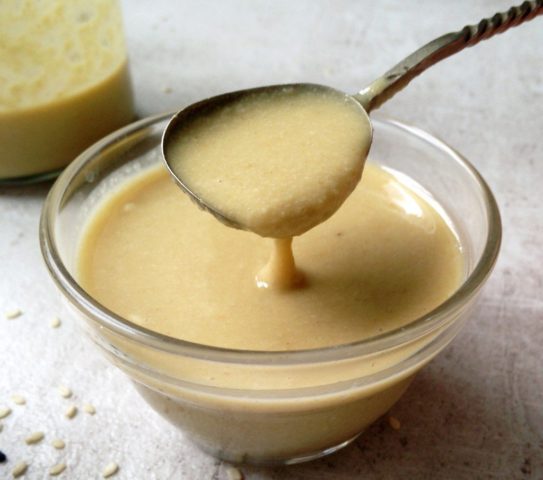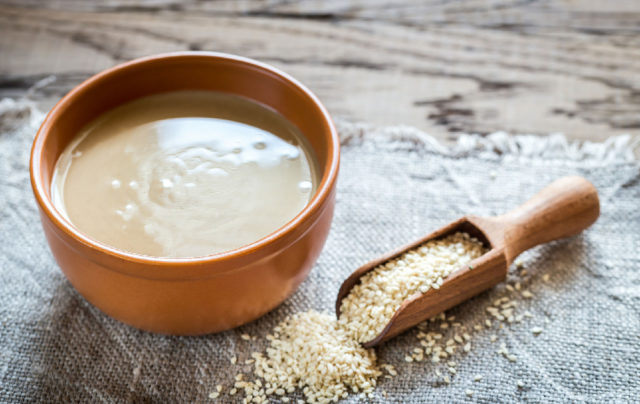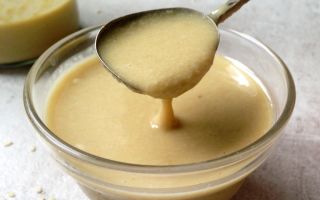Content
The benefits of tahini sesame paste have long been known in eastern countries. It is used to prepare dressings, dips, salads, sweets and other dishes. In the Middle East and Israel, the pasta is known as tahini. It is popular in India, Japan, China, Korea, Greece, North African countries and Cyprus.
What is tahini and its composition
Tahini, or sesame paste, is a creamy product made from ground sesame seeds, with a small amount of vegetable oil allowed. There should be no other ingredients.
The composition of sesame paste contains the following components:
- saturated fats, mono- and polyunsaturated fatty acids Omega-3, 6, 9;
- cellulose;
- vitamins A, C, E, group B;
- minerals - calcium, phosphorus, magnesium, copper, iron, manganese, zinc;
- methionine;
- amino acids.
In terms of calcium, tahini can compete with fatty hard cheeses. 100 g of product contains 96% of the daily value. The same amount of paste is enough to meet the body's needs for more than 100% in manganese, copper, iron.
Nutritional value and calorie content of tahini
Nutritionists advise to observe the measure when using sesame paste, since it is a nutritious and high-calorie product.
The composition of 100 g of tahini contains:
- 18.1 g protein;
- 50.9 g fat;
- 18.6 g of carbohydrates;
- 5.5 g dietary fiber.
The calorie content of sesame paste per 100 grams of product is 590 kcal.
Why sesame paste is useful
The beneficial properties of tahini are due to its rich vitamin and mineral composition. The fiber, organic acids, unsaturated fats contained in the paste have a beneficial effect on health.
Regular use of sesame paste (tahini) is recommended for:
- prevention of the development of cancer;
- improving the work of the blood coagulation system;
- removal from the body of toxins, harmful substances;
- cleansing the liver.
The paste stimulates the body's defenses, improves the condition of blood vessels. It is recommended to be used by people who have been diagnosed with the following diseases:
- diabetes;
- atherosclerosis;
- neurasthenia;
- depressive disorders;
- hypertension;
- arthritis.
This product accelerates the recovery of patients with infectious diseases, protects against seasonal colds. Under the influence of substances contained in sesame paste, the production of white blood cells is triggered, which destroy pathogenic microorganisms.

For women
Doctors advise women to regularly consume small amounts of sesame paste.The benefits become noticeable after 1-2 months of taking this product. Under the influence of the substances contained:
- the condition of the skin improves;
- hair loss stops;
- immunity is strengthened.
The paste is useful for women of any age, but its effect is most pronounced during premenopause. Tahini is a source of phytoestrogens. When using sesame paste, it is possible to prevent the development of hormonal imbalance and eliminate climacteric disorders. Women note that hot flashes disappear, sleep and mood normalize. Phytoestrogens protect against the development of oncological diseases associated with the production of hormones - breast cancer, ovarian cancer.
Due to its high calcium content, tahini is recommended as a means for the prevention of osteoporosis. If this element enters the body in the required quantities and is completely absorbed, then the bone tissue does not become thinner and does not become more fragile.
For men
Not only women, but also men can appreciate the beneficial properties of sesame paste. Tahini is an excellent remedy for increasing libido and normalizing erectile function. This action is due to the inclusion of a large amount of zinc. This element is necessary for the production of the main male hormone - testosterone.
The contained fatty acids stimulate the production of serotonin, the hormone of happiness. As a result, the man becomes less stressed, the signs of chronic fatigue and depression disappear.
The beneficial effect on blood vessels and the heart reduces the risk of developing hypertension, heart attacks and strokes.
For children
Before adding sesame paste to the diet of young children, make sure that there is no allergy to this product. It is desirable to introduce it gradually.
Children are allowed to give tahini after a year. But many pediatricians advise waiting until the age of 3. At this age, the digestive system becomes more mature. If this recommendation is followed, the risk of developing allergies or intolerance reactions is reduced.

When losing weight
Despite the high calorie content of sesame paste, it is recommended to include it in the diet of people who are trying to lose weight. The methionine included in the composition cleanses the body, removes toxins, harmful substances, and reduces the load on the liver.
How to cook tahini at home
You can find ready-made sesame paste in most supermarket chains. But many want to be sure that there are no foreign components, harmful substances in its composition, and they make tahini at home.
Cooking requires sesame seeds. At home, nut, olive, almond or sesame oil is added to obtain a creamy consistency. For 100 g of seeds, 15-20 ml are required.
Sesame must be dried in a dry frying pan or baking sheet in the oven. The sesame should take on a golden hue. It is important not to overcook it, otherwise the pasta will have an unpleasant aftertaste. Prepared seeds need to be crushed with a blender. In the process of beating, the butter is added gradually until the required consistency of thick sour cream is obtained.
The finished product is immediately ready for use. But it is better to eat it in the morning. The body must have time to use up the incoming energy.
How to take sesame paste
Few eat pure tahini. The paste has a specific taste and high fat content. It is better to add it in small quantities to salads, sauces, marinades. Lovers can simply spread tahini on bread. It is advisable to eat no more than 2-4 tbsp per day. l. sesame paste in its pure form.
Fans of oriental sweets can make a spread with fruit syrup. In Greece, tahini with honey is popular. In some countries, the product is used for making halva.
Most often it is included in the diet in the form of dressings. You can make salad dressing by mixing:
- 2 tbsp. l. water, tahini, lemon juice;
- ½ tsp paprika;
- 1 clove of garlic;
- salt pepper.

Harm of tahini and contraindications
For some diseases, it is undesirable to include tahini in the diet. The list of contraindications to the use of sesame paste includes:
- allergy to sesame seeds;
- diseases of the liver, pancreas, gallbladder;
- obesity.
With these diseases, the use of tahini will only harm. People with allergies may experience skin rashes, shortness of breath, swelling, and runny nose. With diseases of the liver, gallbladder and pancreas, diarrhea, abdominal pain, and vomiting are possible. The inclusion of sesame paste in the diet in an amount of more than 1-2 tbsp. l. with obesity, it can lead to weight gain, not weight loss.
How to choose and store tahini
When buying sesame paste, it is better to give preference to producers from the Middle East. The product, made in Greece or Turkey, differs in taste. Experts point out that tahini from these countries has a less pronounced aroma, although for most consumers the difference is not noticeable.
Before buying, you need to look at the expiration date and make sure you follow the storage recommendations. If the paste was left in a warm room for several months, then the vegetable oils included in it could turn rancid.
Store bought or self-prepared sesame paste in the refrigerator. It is suitable for use for 6 months. Commercially produced products can be stored for up to 2 years. But an extended shelf life may indicate that preservatives have been added to the composition.
It is advisable to store self-made sesame paste for no more than 2 months at temperatures up to + 4 ° C. The same shelf life for tahini from stores that sell organic products that do not contain preservatives in their composition.
If the date of manufacture of sesame paste is difficult to remember, then you can smell it or try it. If the oil tastes or smells like rancid, the product has deteriorated. It cannot be used for food, it can be poisoned.
Conclusion
The benefits of tahini sesame paste can be appreciated by all people who have no contraindications to taking it. It has a restorative, tonic effect, promotes the elimination of toxins and improves the condition of blood vessels. With daily use, the immune system is stimulated, libido increases. It is better to include it in the diet not in pure form, but in the form of sauces, additions to other dishes.

